Related Research Articles

Physical geography is one of the two fields of geography. Physical geography is the branch of natural science which deals with the processes and patterns in the natural environment such as the atmosphere, hydrosphere, biosphere, and geosphere, as opposed to the cultural or built environment, the domain of human geography.

Physical science is a branch of natural science that studies non-living systems, in contrast to life science. It in turn has many branches, each referred to as a "physical science", together called the "physical sciences".

Geophysics is a subject of natural science concerned with the physical processes and physical properties of the Earth and its surrounding space environment, and the use of quantitative methods for their analysis. The term geophysics sometimes refers only to solid earth applications: Earth's shape; its gravitational and magnetic fields; its internal structure and composition; its dynamics and their surface expression in plate tectonics, the generation of magmas, volcanism and rock formation. However, modern geophysics organizations and pure scientists use a broader definition that includes the water cycle including snow and ice; fluid dynamics of the oceans and the atmosphere; electricity and magnetism in the ionosphere and magnetosphere and solar-terrestrial physics; and analogous problems associated with the Moon and other planets.

Environmental science is an interdisciplinary academic field that integrates physics, biology, and geography to the study of the environment, and the solution of environmental problems. Environmental science emerged from the fields of natural history and medicine during the Enlightenment. Today it provides an integrated, quantitative, and interdisciplinary approach to the study of environmental systems.

Atmospheric science is the study of the Earth's atmosphere and its various inner-working physical processes. Meteorology includes atmospheric chemistry and atmospheric physics with a major focus on weather forecasting. Climatology is the study of atmospheric changes that define average climates and their change over time, due to both natural and anthropogenic climate variability. Aeronomy is the study of the upper layers of the atmosphere, where dissociation and ionization are important. Atmospheric science has been extended to the field of planetary science and the study of the atmospheres of the planets and natural satellites of the Solar System.

The European Geosciences Union (EGU) is a non-profit international union in the fields of Earth, planetary, and space sciences whose vision is to "realise a sustainable and just future for humanity and for the planet." The organisation has headquarters in Munich (Germany). Membership is open to individuals who are professionally engaged in or associated with these fields and related studies, including students and retired seniors.
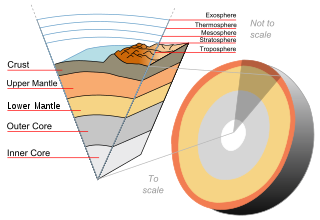
The following outline is provided as an overview of and topical guide to Earth science:
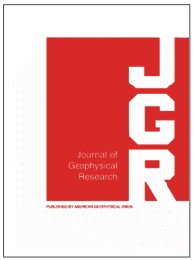
The Journal of Geophysical Research is a peer-reviewed scientific journal. It is the flagship journal of the American Geophysical Union. It contains original research on the physical, chemical, and biological processes that contribute to the understanding of the Earth, Sun, and Solar System. It has seven sections: A, B, C (Oceans), D (Atmospheres), E (Planets), F, and G (Biogeosciences). All current and back issues are available online for subscribers.

The International Union of Geodesy and Geophysics is an international non-governmental organization dedicated to the scientific study of Earth and its space environment using geophysical and geodetic techniques.
The Geological Association of Canada (GAC) is a learned society that promotes and develops the geological sciences in Canada. The organization holds conferences, meetings and exhibitions for the discussion of geological problems and the exchange of views in matters related to geology. It publishes various journals and collections of learned papers dealing with geology.
The following outline is provided as an overview of and topical guide to geology:
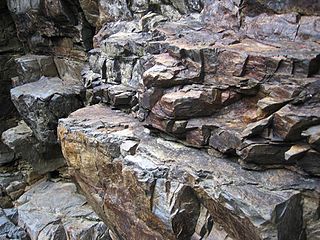
Earth science or geoscience includes all fields of natural science related to the planet Earth. This is a branch of science dealing with the physical, chemical, and biological complex constitutions and synergistic linkages of Earth's four spheres, namely biosphere, hydrosphere, atmosphere, and geosphere. Earth science can be considered to be a branch of planetary science, but with a much older history. Earth science encompasses four main branches of study, the lithosphere, the hydrosphere, the atmosphere, and the biosphere, each of which is further broken down into more specialized fields.

A geologist is a scientist who studies the solid, liquid, and gaseous matter that constitutes Earth and other terrestrial planets, as well as the processes that shape them. Geologists usually study geology, although backgrounds in physics, chemistry, biology, and other sciences are also useful. Field research is an important component of geology, although many subdisciplines incorporate laboratory and digitalised work.
The following outline is provided as an overview of and topical guide to natural science:
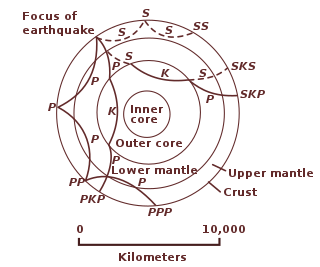
The following outline is provided as an overview of and topical guide to geophysics:
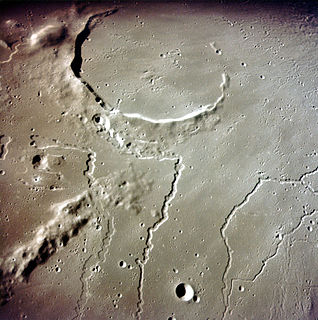
Planetary science is the scientific study of planets, celestial bodies and planetary systems and the processes of their formation. It studies objects ranging in size from micrometeoroids to gas giants, aiming to determine their composition, dynamics, formation, interrelations and history. It is a strongly interdisciplinary field, which originally grew from astronomy and earth science, and now incorporates many disciplines, including planetary geology, cosmochemistry, atmospheric science, oceanography, hydrology, theoretical planetary science, glaciology, and exoplanetology. Allied disciplines include space physics, when concerned with the effects of the Sun on the bodies of the Solar System, and astrobiology.

The Department of Earth and Environmental Sciences at The University of Manchester is one of the oldest earth and environmental science departments in the UK. The Department takes roughly 100 new undergraduates and 140 postgraduates each year, and employs 90 members of academic staff, 41 postdoctoral researchers, 27 technical staff and 20 administrative staff.
References
- Adams, Simon; Lambert, David (August 2006). Earth Science: An illustrated guide to science. New York, NY: Chelsea House Publishers. ISBN 0-8160-6164-5.